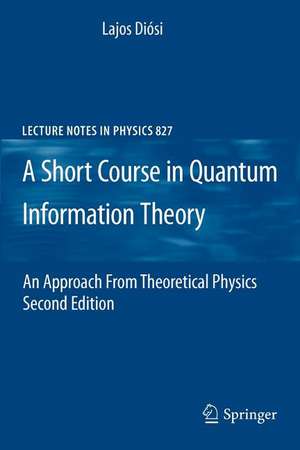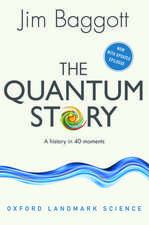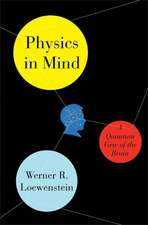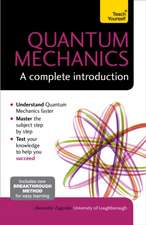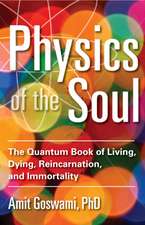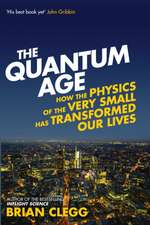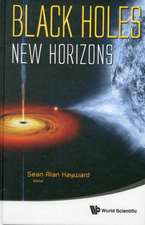A Short Course in Quantum Information Theory: An Approach From Theoretical Physics: Lecture Notes in Physics, cartea 827
Autor Lajos Diosien Limba Engleză Paperback – 3 iun 2011
Din seria Lecture Notes in Physics
- 19%
 Preț: 423.99 lei
Preț: 423.99 lei - 17%
 Preț: 360.73 lei
Preț: 360.73 lei -
 Preț: 429.22 lei
Preț: 429.22 lei - 17%
 Preț: 427.62 lei
Preț: 427.62 lei - 17%
 Preț: 460.25 lei
Preț: 460.25 lei -
 Preț: 427.96 lei
Preț: 427.96 lei -
 Preț: 481.93 lei
Preț: 481.93 lei - 17%
 Preț: 494.64 lei
Preț: 494.64 lei -
 Preț: 281.90 lei
Preț: 281.90 lei - 17%
 Preț: 493.20 lei
Preț: 493.20 lei - 17%
 Preț: 426.72 lei
Preț: 426.72 lei -
 Preț: 365.15 lei
Preț: 365.15 lei -
 Preț: 374.52 lei
Preț: 374.52 lei -
 Preț: 407.98 lei
Preț: 407.98 lei - 20%
 Preț: 428.12 lei
Preț: 428.12 lei -
 Preț: 263.30 lei
Preț: 263.30 lei - 15%
 Preț: 593.73 lei
Preț: 593.73 lei - 15%
 Preț: 528.13 lei
Preț: 528.13 lei -
 Preț: 493.12 lei
Preț: 493.12 lei - 17%
 Preț: 425.68 lei
Preț: 425.68 lei -
 Preț: 280.65 lei
Preț: 280.65 lei -
 Preț: 163.41 lei
Preț: 163.41 lei - 18%
 Preț: 726.59 lei
Preț: 726.59 lei -
 Preț: 394.84 lei
Preț: 394.84 lei - 15%
 Preț: 709.63 lei
Preț: 709.63 lei - 15%
 Preț: 623.90 lei
Preț: 623.90 lei - 20%
 Preț: 476.91 lei
Preț: 476.91 lei - 15%
 Preț: 428.05 lei
Preț: 428.05 lei -
 Preț: 342.78 lei
Preț: 342.78 lei - 18%
 Preț: 851.93 lei
Preț: 851.93 lei -
 Preț: 346.61 lei
Preț: 346.61 lei -
 Preț: 391.57 lei
Preț: 391.57 lei - 15%
 Preț: 633.16 lei
Preț: 633.16 lei -
 Preț: 451.71 lei
Preț: 451.71 lei - 5%
 Preț: 1497.80 lei
Preț: 1497.80 lei -
 Preț: 374.85 lei
Preț: 374.85 lei -
 Preț: 380.07 lei
Preț: 380.07 lei - 15%
 Preț: 516.14 lei
Preț: 516.14 lei - 15%
 Preț: 583.78 lei
Preț: 583.78 lei - 15%
 Preț: 508.60 lei
Preț: 508.60 lei -
 Preț: 469.71 lei
Preț: 469.71 lei -
 Preț: 388.90 lei
Preț: 388.90 lei - 15%
 Preț: 500.24 lei
Preț: 500.24 lei -
 Preț: 386.52 lei
Preț: 386.52 lei - 15%
 Preț: 472.88 lei
Preț: 472.88 lei -
 Preț: 424.27 lei
Preț: 424.27 lei -
 Preț: 380.07 lei
Preț: 380.07 lei - 15%
 Preț: 500.01 lei
Preț: 500.01 lei
Preț: 348.77 lei
Nou
Puncte Express: 523
Preț estimativ în valută:
66.74€ • 69.68$ • 55.23£
66.74€ • 69.68$ • 55.23£
Carte tipărită la comandă
Livrare economică 05-19 aprilie
Preluare comenzi: 021 569.72.76
Specificații
ISBN-13: 9783642161162
ISBN-10: 3642161162
Pagini: 180
Ilustrații: XV, 161 p. 23 illus.
Dimensiuni: 155 x 235 x 13 mm
Greutate: 0.27 kg
Ediția:2nd ed. 2011
Editura: Springer Berlin, Heidelberg
Colecția Springer
Seria Lecture Notes in Physics
Locul publicării:Berlin, Heidelberg, Germany
ISBN-10: 3642161162
Pagini: 180
Ilustrații: XV, 161 p. 23 illus.
Dimensiuni: 155 x 235 x 13 mm
Greutate: 0.27 kg
Ediția:2nd ed. 2011
Editura: Springer Berlin, Heidelberg
Colecția Springer
Seria Lecture Notes in Physics
Locul publicării:Berlin, Heidelberg, Germany
Public țintă
ResearchCuprins
Introduction.- Foundations of Classical Physics.- Semiclassical -Semi-q-physics.- Foundations of q-physics.- Two-state q-system: Qubit Representations.- One-qubit Manipulaitons.- Composite q-system, Pure State.- All q-operations.- Classical Information Theory.- Q-Information Theory.- Q-computation.- Qubit Thermodyanmics.- Appendix.- Solutions.- References.- Index.
Recenzii
From the reviews of the second edition:
“The present work describes the basics in Quantum Information Theory … . It contain 12 chapters which graduate the theory and start from physics basic, draw up the Qubit Manipulation and Q-Operations, finalizing by Q-Computations and Qubit Thermodynamics. The entire course is done for students, each chapter has exercises and bibliography. In the end of the work the solutions for the exercises are presented. … a valuable introductory in the field of Quantum theory … .” (Nicolae Constantinescu, Zentralblatt MATH, Vol. 1232, 2012)
“The present work describes the basics in Quantum Information Theory … . It contain 12 chapters which graduate the theory and start from physics basic, draw up the Qubit Manipulation and Q-Operations, finalizing by Q-Computations and Qubit Thermodynamics. The entire course is done for students, each chapter has exercises and bibliography. In the end of the work the solutions for the exercises are presented. … a valuable introductory in the field of Quantum theory … .” (Nicolae Constantinescu, Zentralblatt MATH, Vol. 1232, 2012)
Textul de pe ultima copertă
This short and concise primer takes the vantage point of theoretical physics and the unity of physics. It sets out to strip the burgeoning field of quantum information science to its basics by linking it to universal concepts in physics. An extensive lecture rather than a comprehensive textbook, this volume is based on courses delivered over several years to advanced undergraduate and beginning graduate students, but essentially it addresses anyone with a working knowledge of basic quantum physics. Readers will find these lectures a most adequate entry point for theoretical studies in this field. For the second edition, the authors has succeeded in adding many new topics while sticking to the conciseness of the overall approach. A new chapter on qubit thermodynamics has been added, while new sections and subsections have been incorporated in various chapter to deal with weak and time-continuous measurements, period-finding quantum algorithms and quantum error corrections. From the reviews of the first edition: "The best things about this book are its brevity and clarity. In around 100 pages it provides a tutorial introduction to quantum information theory, including problems and solutions. … it’s worth a look if you want to quickly get up to speed with the language and central concepts of quantum information theory, including the background classical information theory." (Craig Savage, Australian Physics, Vol. 44 (2), 2007)
Caracteristici
Concise but self-contained primer suitable for self-guided studies. Contains problems and solutions. Efficiently compares the classical and the quantum approaches to information theory and processing.
